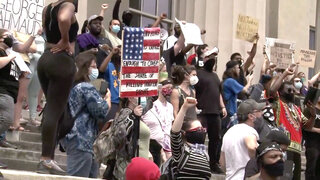
Create a free profile to get unlimited access to exclusive videos, sweepstakes, and more!
Porsha Williams Opens Up About Her Miscarriage and the Treatment of Black Patients
The RHOA mom shared her story as part of a larger discussion about systemic racism in the medical field, with Dr. Britten Cole, Dr. Simone Whitmore, and Dr. Eugene Harris.
Porsha Williams has previously opened up about the miscarriage she experienced before giving birth to her daughter, Pilar Jhena McKinley. At the time, The Real Housewives of Atlanta cast member noted that she was sharing her story “to help other women,” and now, she is using her voice to shed light on the racism that is prevalent in the medical community. Porsha spoke about her experience during Bravo’s roundtable discussion, Race in America: a Movement Not a Moment.
“With my first miscarriage, I was actually sent home about three or four different times telling them that I was in pain, and I felt like I was going to have a miscarriage. And it just goes back to doctors feeling like Black women have this serious threshold for pain,” Porsha explained. “You have to manage pain for patients, because that can trigger other things in the body, and so, I really do feel like the pain management around that time, I ended up having fibroids and that’s what was causing it, is what caused so much stress on my body that I ended up having a miscarriage.”
As an anesthesiologist, Dr. Britten Cole from Married to Medicine Los Angeles described the racism she has seen firsthand, explaining the stark difference between the treatment Black and white patients receive.
“This is real. The disparities are huge,” said Dr. Britten. “Not to mention, the disparities within the medical community itself, within the healthcare staff. We have our own battles we’re fighting among other doctors, right? There’s no support in the system for us as physicians. That’s why most of these academic institutions don’t have Black physicians to take care of the Black community, because they end up shifting them out, because they get pushed out because it’s a hostile environment.”
Dr. Britten also described the conditions that often lead to Black patients feeling distrustful of the medical system.
“A lot of Black people, Latino people, they typically go to community hospitals, community clinics, and that’s where they get their healthcare. Why? Because they see doctors that look like them. They speak their language, so they feel more comfortable there, and they know once they go to the big house, and that’s what we call the major academic institutions, they’ll get lost. There’s no one who speaks their language, no one who understands them, and no one who really cares about them,” she said. “So they get slower treatment, they get minimal treatment. They don’t get what they need, so they’re in these communities, they don’t have enough staff members, they have subpar equipment, so they don’t even have what they need in these communities.”
Dr. Simone Whitmore from Married to Medicine noted that as a physician, she deals with racism in the workplace on a daily basis.
“We deal with racism at the hospital every day: our patients, we as physicians. One of the most important points I want to make, because here in Atlanta, we are so spoiled that there are so many African American physicians in various specialities, but in the U.S., there are only 7 percent of physicians across this country,” said Dr. Simone. “It’s a small number when you look up that we makeup 12 percent of the population, so at a minimum, the African Americans should make up 12 percent of the physician community."
Dr. Eugene Harris explained that these issues stem from systemic racism that has long impacted the medical community.
“It is systemic. It starts with better access to medical education. We shouldn’t be 5 to 7 percent of doctors in the country. And then when Black doctors, we make it, we are able to help Black patients and we’re able to help our white physician counterparts relate better to Black patients as well,” he said. “We have to have a seat at the table to enact change.”
For more conversations from Race in America: a Movement Not a Moment, watch the full episode through the Bravo app.































